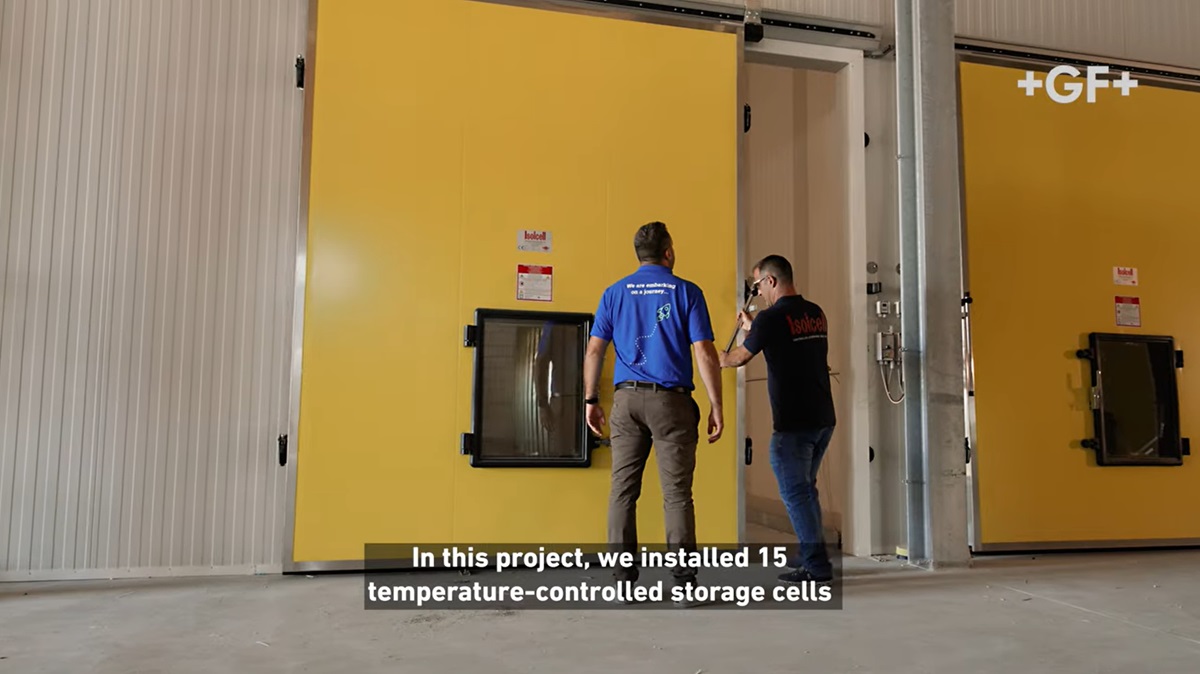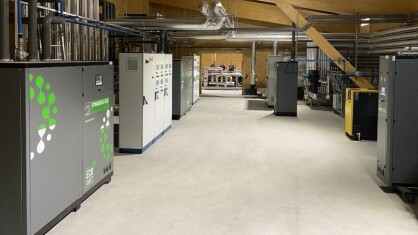Cooling and CA
Fluorescence detection sensors to dynamically control the atmosphere
More than 350.000 tons of apples are stored worldwide using ISOSTORE® technology. This new technology was patented in Canada and further developed by the researcher Dr. Angelo Zanella of the Agricultural Research Institue Laimburg. It has been applied successfully for the medium-long term storage of apples and is distributed exclusively by ISOLCELL S.p.A. the leading company in this sector.
27 March, 2017
More than 350.000 tons of apples are stored worldwide using ISOSTORE® technology. This new technology was patented in Canada and further developed by the researcher Dr. Angelo Zanella of the Agricultural Research Institue Laimburg. It has been applied successfully for the medium-long term storage of apples and is distributed exclusively by ISOLCELL S.p.A. the leading company in this sector.This technology uses fluorescence detection sensors to dynamically control the atmosphere and allows to store fruit at its lowest respiration rate. These sensors called F.I.R.M. (Fluorescence Interactive Response Monitor) measure the amount of light emitted by the fruit's peel in the form of fluorescence. This enables us to exactly pin point the A.C.P. (Anaerobic Compensation Point) an essential parameter in determining the minimum level of O2 to be maintained in the room during storage. The use of these sensors ensures the quick and precise determination of the A.C.P. both online and in real time, making the use of ISOSTORE® technology both very easy and very safe. The principle of fluorescenceIn practice the level of oxygen within the storage rooms is lowered until the point where the software running the ISOSTORE system detects a higher signal of fluorescence. At this point the operator sets the oxygen level for the storage period to a slightly higher set value and the level of CO2 is set accordingly. Fluorescence SignalD.C.A. (Dynamic Controlled Atmosphere) enables you to create the ideal conditions for the medium-long term storage of any kind of fruit by allowing you to lower the oxygen levels in storage rooms to between 0.4%- 0,7% (for apples) without the risk of hypoxia and correlated physiological disorders. During the storage period using Isostore it is possible to set and adapt the values of gases in a dynamic manner based on the maturity, annual climatic variations, different origins and varying respiratory rhythms of the monitored fruit. This technology is particularly suitable for organically produced fruit and is being used successfully in order to avoid post-harvest treatment with diphenylamine (DPA) or 1-MCP. D.C.A. has been shown to maintain all the organoleptic properties of the produce (firmness, juiciness, sugar content, acidity, flavour etc.), thus ensuring much longer storage periods compared with conventional C.A.storage and guaranteeing excellent quality of the product during the following shelf-life phase. Another advantage of using D.C.A. is the ability to control scald which is a significant physiological disorder of many apple and pear varieties during medium-long term storage. D.C.A. has also shown to be effective in the reduction of internal browning and rot during storage in varieties such as Braeburn, Granny, Pink Lady and Fuji. As well as the important aspects mentioned above, DCA has in recent years established itself in the commercial sector mainly due to the control of common scald on numerous apple varieties ( Red.del, Granny S., Pink Lady, Jonagold, Elstar, Fuji, Idared, Maigold, ecc.) and pear varieties ( Anjou, Abate F., Conference, Bartlett, Rocha, etc.) The imminent ban in Europe of post-harvest chemical treatments against scald such as DPA for apples and Ethoxyquin for pears means that DCA allows apple and pear operators worldwide to look to the future ahead with a certain degree of optimism. Dynamic Controlled Atmosphere-Isostore® can therefore be defined as state-of-the-art technology in the Controlled Atmosphere sector and represents a significant improvement over conventional CA storage systems which are based on maintaining pre-programmed and static values of gasses in the storage room as opposed to the new Isostore® software which allows you to continously monitor the possible stress of hypoxia in real time, thus enabling you to maintain an optimal dynamic-adaptive atmosphere in the room. In order to simplify the concept one can say that the monitored fruit is now able to communicate its distress to us by using the common language of fluorescence and the operator simply has to act upon this. The interest and success of every new system is normally endorsed by the achieved commercial results and in this regard Isolcell SpA can be more than satisfied with the results achieved up until now. After the successful albeit justifiably cautious introduction in 2003 of ISOSTORE® technology in South Tyrol (Italy), to this day (2014) more than 1300 operational storage rooms are now to be found both in Italy than abroad (Argentina, Chile, Brazil, U.S.A., U.K., Germany, Poland, Austria, Swiss, Austria, Slovenia, Croatia, Serbia, Israel, France, Spain and Portugal, South Africa and New Zeland). There are also 19 research institutes worldwide working with D.C.A. and the F.I.R.M. fluorescence sensor in order to implement this technology in the future not only to new varieties of apple and pears but also new and cultivars. ISOSTORE® is recognized by leading industry experts as the most suitable biological and natural alternative to DPA and 1-MCP use for the conservation of apples and pears. More information











